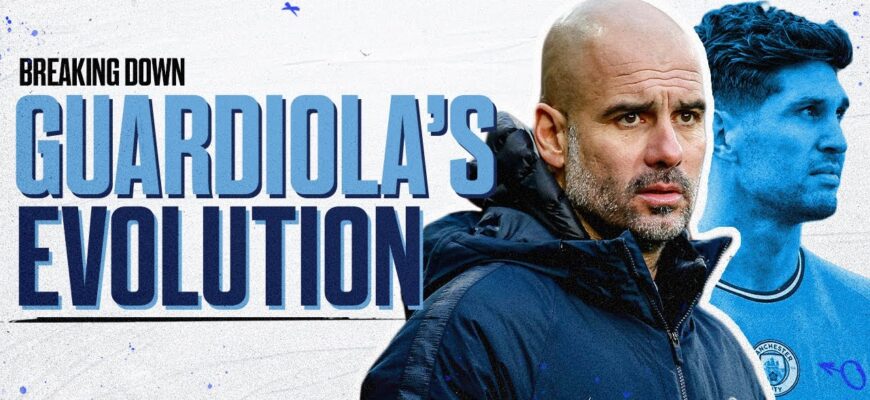For nearly a decade, Pep Guardiola has meticulously sculpted Manchester City into a footballing behemoth, a team synonymous with possession, intricate passing, and a goalkeeper as comfortable with the ball at his feet as any outfield player. The departure of Joe Hart and the arrival of Ederson famously underscored this philosophy. Yet, recent reports linking City with Gianluigi Donnarumma, a goalkeeper renowned for his shot-stopping prowess rather than his passing range, signal a potentially seismic shift in Guardiola`s tactical blueprint. Is the architect of modern football truly rethinking the foundational role of his last line of defense?
The Ball-Playing Blueprint: A Historical Perspective
When Pep Guardiola first graced the Premier League touchlines, his vision for goalkeeping was clear and, frankly, revolutionary for English football. The traditional shot-stopper was no longer sufficient; the goalkeeper needed to be the eleventh outfield player, initiating attacks and distributing with laser precision. Joe Hart, a fine keeper by conventional standards, became a poignant symbol of this shift, deemed unsuitable for the intricate demands of Guardiola`s system. In his stead, Claudio Bravo and later Ederson arrived, epitomizing the `sweeper-keeper` ideal. Ederson, with his audacious long-range passing and composure under pressure, quickly established himself as a cornerstone of City`s dominant era, capable of launching incisive attacks from his own penalty area.
A Subtle Evolution: The Ederson Era`s Nuances
While Ederson has undoubtedly been instrumental in City`s success, his tenure hasn`t been without its occasional `niggly` moments, as some observers might politely put it. There have been instances where the Brazilian`s decision-making or handling has led to collective sighs, prompting questions about the balance between ball-playing ability and fundamental shot-stopping. Such fluctuations, though infrequent, can be amplified in the high-stakes environment of the Premier League and Champions League. It seems that even for a manager as ideologically driven as Guardiola, pragmatism eventually enters the equation when the margins for error grow ever tighter.
Donnarumma: The Uncompromising Shot-Stopper Emerges
Enter Gianluigi Donnarumma. At 26, the Italian international is unequivocally one of the world`s elite goalkeepers when it comes to keeping the ball out of the net. His performances, particularly in the Champions League, have frequently defied expected goals models, showcasing a remarkable ability to make crucial saves. Last season, he proved a formidable barrier, playing a pivotal role in his team`s deep runs in European competitions. He stands alongside names like Thibaut Courtois and Jan Oblak in the pantheon of pure shot-stopping brilliance.
However, Donnarumma`s profile presents a stark contrast to Guardiola`s traditional preference. While his hands are exceptional, his feet, by comparison, are not his strongest suit. One can recall the notable instance in the 2022 Champions League where a misjudgment with the ball led directly to a Karim Benzema goal, altering the complexion of a crucial tie. He averages fewer touches per 90 minutes than his ball-playing counterparts, suggesting a less involved role in buildup play. This isn`t a criticism of his overall quality, but a factual assessment of his specific skillset. Signing Donnarumma implies a conscious decision to prioritize defensive resilience over intricate passing from the back.
The Complementary Acquisition: James Trafford`s Role
Further cementing this apparent shift is the anticipated arrival of James Trafford. After a stellar season with Burnley in the Championship, where his 29 clean sheets were a testament to his traditional goalkeeping strengths, Trafford is set to return to City. Like Donnarumma, Trafford`s primary asset is his ability to prevent goals, not to instigate attacking phases with intricate footwork. While promising, even Trafford has shown moments of discomfort with the ball at his feet, hinting that City`s new goalkeeping department leans heavily towards shot-stopping proficiency. It’s an interesting scenario for a young keeper who might have envisioned himself as the long-term ball-playing successor, now potentially vying for a spot behind another pure shot-stopper.
The Tactical Conundrum: A More Open City?
The implications of this goalkeeping overhaul are profound. If Manchester City is indeed opting for shot-stoppers over ball-players, it suggests a potential, albeit subtle, re-evaluation of their overall playing style. Could Guardiola be preparing for a more transitional team, one that might concede more chances but relies on a world-class last line of defense to negate them? It`s a plausible theory. If City`s games are to become more open, perhaps by design or simply as a natural evolution in a fiercely competitive league, then a goalkeeper who consistently outperforms expected goals is an invaluable asset. The relentless pursuit of perfection, even if it means tweaking a sacrosanct philosophy, is a hallmark of Guardiola’s genius.
The Pep Paradox: Innovation Versus Core Principles
Yet, a lingering question remains, a delightful paradox for football analysts: Can Pep Guardiola truly abandon his foundational principles of absolute control and possession? Two decades of managerial history suggest a man deeply committed to a specific, intricate brand of football. Is this a genuine, long-term tactical evolution, or a pragmatic response to the unique demands of the Premier League and the relentless quest for silverware? The irony, of course, would be if City, having invested in pure shot-stoppers, eventually finds itself reverting to a control-centric style where the lack of a dominant ball-playing goalkeeper becomes a tactical hindrance. Only time will tell if this calculated gamble pays off, or if it marks a temporary deviation before Guardiola returns to his purest form of footballing artistry.
The reported pursuit of Gianluigi Donnarumma and the recruitment of James Trafford represent more than just transfer news; they signify a fascinating turning point in Pep Guardiola`s Manchester City project. It`s a testament to his relentless desire to innovate, even if it means challenging the very dogmas he once established. The Premier League awaits, eager to see if this shift in goalkeeping philosophy ushers in a new, perhaps more unpredictable, era for the reigning champions.








